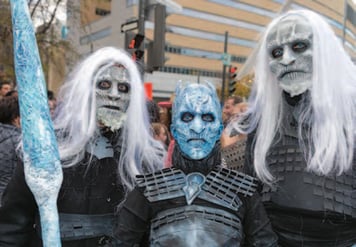
This past summer, a line of several hundred people formed daily outside a small bar in Washington, DC. The line, which stretched around three city blocks, consisted of young adults and professionals willing to wait hours to pack into the bar’s modest space. The interior décor of the bar had been designed to resemble Westeros, the mythic, medieval land where HBO’s hit television show Game of Thrones takes place. Of the hundreds in line outside, many dressed as their favorite characters from Thrones, reveling in their chance to quote famous lines and gossip about the new season with fellow fans.

Once through the door, these young professionals could purchase overpriced drinks served in massive wooden drinking horns while marveling at a smoke-breathing dragon’s head mounted on the wall. Finally, most would willingly join another line for the chance to strike a pose and take a photo on a replica of the Iron Throne, the ultimate seat of power in Westeros.
These patrons are a fraction of the tens of millions who have been captivated by the television phenomenon of Game of Thrones. The plot, originally told in a series of books authored by George R.R. Martin, revolves around multiple warring families seeking control of the kingdom through violence, cunning and deceit. The show is infamous for eschewing the traditional “good-triumphs-over-evil” fantasy trope that is familiar from other genre giants like Lord of the Rings or Harry Potter. Instead of virtuous heroes and wicked villains, Thrones embraces a brutal realism where characters are morally conflicted and rarely pure in motive. The few sympathetic, audience-loved characters are often led to their grisly deaths by their good hearts, foolish idealism and costly mistakes. Consequently, the conniving, the amoral and the self-centered often triumph in their pursuit of power, and are only defeated by similarly minded and equally unscrupulous competitors.
Clashing with this genre-rejecting realism are supernatural forces lurking in the margins of the main plotlines. These forces, in the form of dragons, ancient magic and hordes of undead soldiers constantly cast a shadow over the schemes and struggles of the main characters, threatening existential destruction for all.
Explaining how a television show becomes a cultural touchstone is rarely simple. Explaining why a twenty-six-year-old will don a wig and cape and wait in line for two hours to purchase a $13 cocktail necessitates serious academic study. What draws our culture to Game of Thrones? Perhaps, in the midst of negative news cycles, we seek escapism in fantasy. The explicit violence and sexual content of the show could simply be bread and circus for the modern day. Perhaps we project our political and social divisions onto the conflicts of the show, and enjoy cheering for our “side.” Maybe we find allegories for climate change or nuclear war in stories of looming doom. Could social isolation and secularization be driving us to seek a shared story, a communal narrative by which we learn and bond? Perhaps the believer in us awaits the triumph of good and
the defeat of evil, so masterfully delayed for so long by Thrones. Regardless, those who seek to interpret popular culture are faced with many ideas to ponder within this show, and the effect it has had on the world around us.